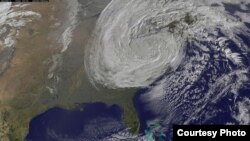Time is running out to stem the potentially disastrous effects of global warming, according to a report issued by the World Bank on Sunday.
The report, entitled "Turn Down the Heat: Why a 4°C Warmer World Must be Avoided," warns that the world is on track to see a 4°C rise in temperatures by 2100, which could bring crippling heat waves, increased risk of food shortages, damage to a variety of ecosystems, an irreversible decrease in biodiversity and a life-threatening rise in sea levels.
"A 4°C warmer world can, and must be, avoided – we need to hold warming below 2°C," said World Bank Group President Jim Yong Kim. "Lack of action on climate change threatens to make the world our children inherit a completely different world than we are living in today. Climate change is one of the single biggest challenges facing development, and we need to assume the moral responsibility to take action on behalf of future generations, especially the poorest."
Other potential effects of a rise of 4°C include increased water scarcity and increased frequency and strength of tropical storms.
“Lack of action on climate change not only risks putting prosperity out of reach of millions of people in the developing world, it threatens to roll back decades of sustainable development,” Kim wrote in the paper.
Furthermore, the report, which the World Bank said was reviewed by some of the world’s top environmental scientists, warns that all of this could happen even if countries fulfill their current emission reduction pledges. Under the Kyoto Protocol, 37 countries pledged to reduce greenhouse by an average of five percent against 1990 levels in the period from 2008 to 2012.
"This report reinforces the reality that today’s climate volatility affects everything we do," said Rachel Kyte, the Bank’s Vice President for Sustainable Development. "We will redouble our efforts to build adaptive capacity and resilience, as well as find solutions to the climate challenge."
The World Bank administers the $7.2 billion Climate Investment Funds, which operate in 48 countries. It leverages an additional $43 billion in investment in clean energies and climate resilience.
The World Bank report comes a week before the 18th meeting of the United Nations Framework Convention on Climate Change, which will be held in Doha, Qatar from November 26 to December 7.
The report, entitled "Turn Down the Heat: Why a 4°C Warmer World Must be Avoided," warns that the world is on track to see a 4°C rise in temperatures by 2100, which could bring crippling heat waves, increased risk of food shortages, damage to a variety of ecosystems, an irreversible decrease in biodiversity and a life-threatening rise in sea levels.
"A 4°C warmer world can, and must be, avoided – we need to hold warming below 2°C," said World Bank Group President Jim Yong Kim. "Lack of action on climate change threatens to make the world our children inherit a completely different world than we are living in today. Climate change is one of the single biggest challenges facing development, and we need to assume the moral responsibility to take action on behalf of future generations, especially the poorest."
Other potential effects of a rise of 4°C include increased water scarcity and increased frequency and strength of tropical storms.
“Lack of action on climate change not only risks putting prosperity out of reach of millions of people in the developing world, it threatens to roll back decades of sustainable development,” Kim wrote in the paper.
Furthermore, the report, which the World Bank said was reviewed by some of the world’s top environmental scientists, warns that all of this could happen even if countries fulfill their current emission reduction pledges. Under the Kyoto Protocol, 37 countries pledged to reduce greenhouse by an average of five percent against 1990 levels in the period from 2008 to 2012.
"This report reinforces the reality that today’s climate volatility affects everything we do," said Rachel Kyte, the Bank’s Vice President for Sustainable Development. "We will redouble our efforts to build adaptive capacity and resilience, as well as find solutions to the climate challenge."
The World Bank administers the $7.2 billion Climate Investment Funds, which operate in 48 countries. It leverages an additional $43 billion in investment in clean energies and climate resilience.
The World Bank report comes a week before the 18th meeting of the United Nations Framework Convention on Climate Change, which will be held in Doha, Qatar from November 26 to December 7.





